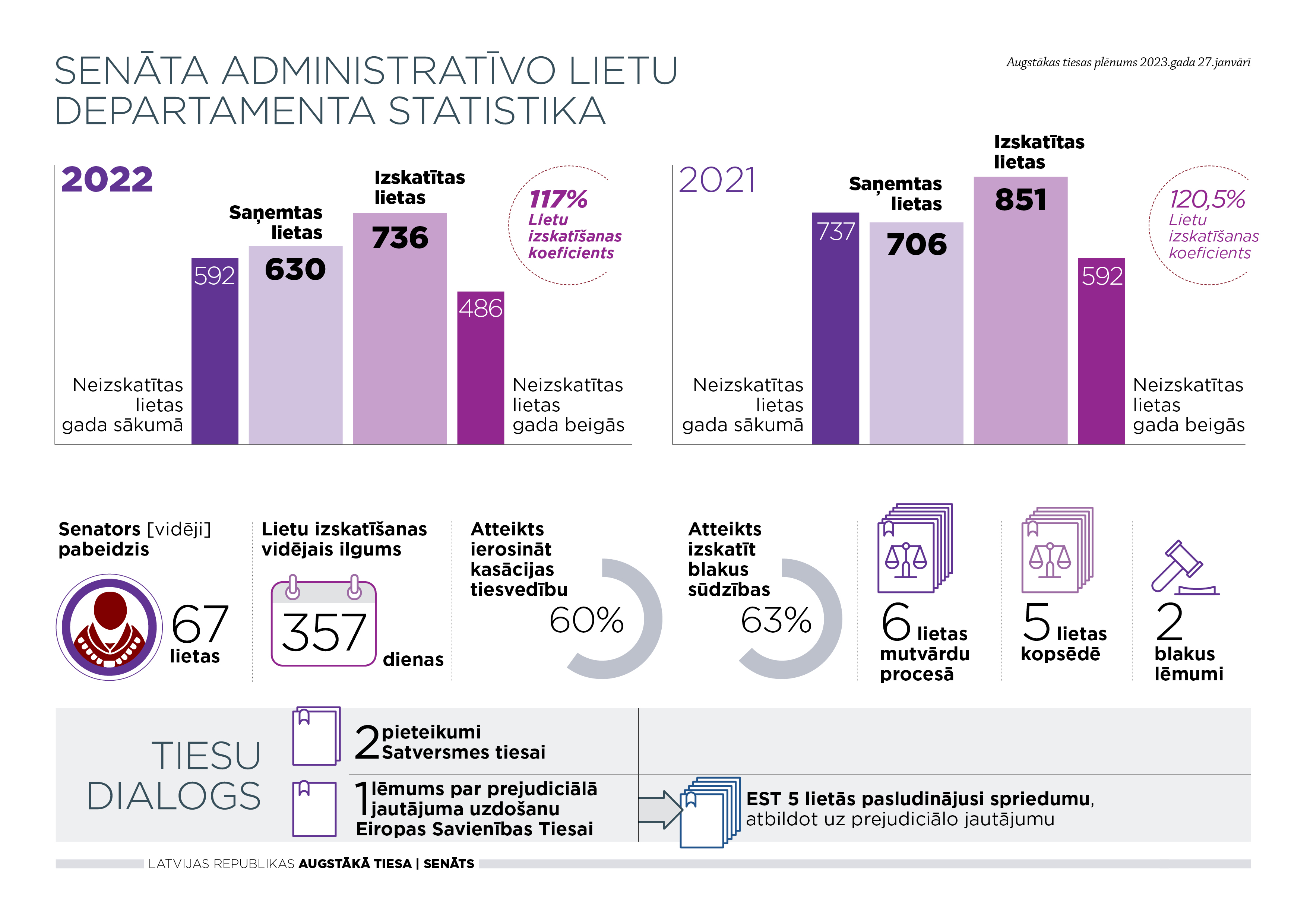30 January, 2023
Veronika Krūmiņa, Chair of the Department of Administrative Cases of the Senate, characterizes the past year as one of intense work, including complex issues and changes, but remaining positive in general.
In 2022, there were 1222 cases pending in the Department, 736 cases or 60.2% of which were examined. The backlog of pending cases, compared to 2021, was reduced by almost 18%.
There was an increase in the number of rulings adopted in cassation in which the judgment of a lower court was annulled and the case was sent for a re-examination. 45.3% of all judgments were completely cancelled (39.3% in 2021).
An interesting trend emerged regarding refusals to initiate cassation proceedings. The number of cases where it was concluded that the cassation complaint itself did not meet the requirements increased significantly. If in 2021 such grounds for refusal pertained to 10.9% of cassation complaints, then in 2022 it was 18.4%. The Chair of the Department points out that these data confirm the necessity for guidelines for drawing up cassation complaints, thus instructing parties to proceedings and, hopefully, reducing the number of cassation complaints that do not comply with statutory requirements and, accordingly, the workload of the Senate departments when assessing the complaints.
Last year, for the first time, the provision of the Administrative Procedure Law was used, which allows the refusal to initiate cassation proceedings if the cassation complaint is blatantly offensive and defiant.
In 2022, the average length of proceedings in the Department was 357 days. The length of proceedings is still being affected by the backlog of cases from previous years. It is gradually being dealt with, but there are still cases that have been pending in the Department for more than 3 years. In 2023, and possibly also in 2024, the average length of proceedings will be significantly affected by the number of cases in which legal proceedings have been suspended due to appeals to the Constitutional Court and the Court of Justice of the European Union (a total of 4 cases before the Constitutional Court, 47 cases before the Court of the European Union). However, there has arisen a positive trend in deciding the cases received at the stage of the application of cassation filter, namely the average time period until the examination of a case in assignment sitting was 110 days (174 in 2021).
V. Krūmiņa noted that in addition to examination of court cases senators and employees of the Department actively engage in projects aimed at preventive improvement of the quality of lower court rulings, as well as public education on justice issues. The Department is also actively involved in international cooperation; it is representing the Supreme Court in seminars organized by the Association of the Councils of State and Supreme Administrative Jurisdictions of the EU and providing answers to the Association's surveys, as well as sharing experience with colleagues from Croatia, Italy, the Netherlands, Romania, Kyrgyzstan, Lithuania, Uzbekistan, and Ukraine.
In 2022, the Department passed significant rulings in various categories of cases, such as cases regarding tax law, environmental rights, children's rights, and public procurement. V. Krūmiņa particularly noted the rulings on the right of a local government deputy to request that the project submitted by him/her be advanced for consideration at the council meeting; on the police as an institution having general authority to respond to violations of legal norms; on monitoring compliance with environmental accessibility requirements in publicly accessible buildings; on abusive avoidance of a child’s parent living with the child of the execution of the court ruling on ensuring access rights.
What regards the plans for 2023, the Chair of the Department prioritizes active work on the examination of old cases, as well as reducing the length of proceedings. Also, several projects are planned this year with the active participation of the Department of Administrative Cases, namely the seminar of the Association of the Councils of State and Supreme Administrative Jurisdictions of the EU in Riga, the introduction of electronic case management system in the administrative procedure, the preparation of educational materials for students, etc.
On January 27, the Plenary Session evaluated the work of the Supreme Court in 2022. The work of the structural units was analysed by their heads, namely by chairs of Senate departments and heads of the Division of Case Law and Research and the Administration. The report was also given by the Chair of the Disciplinary Court. The Plenary Session was addressed by the Prosecutor General and the Minister of Justice.
Information prepared by
Rasma Zvejniece, the Head of the Division of Communication of the Supreme Court
E-mail: rasma.zvejniece@at.gov.lv, telephone: +371 67020396, +371 28652211


